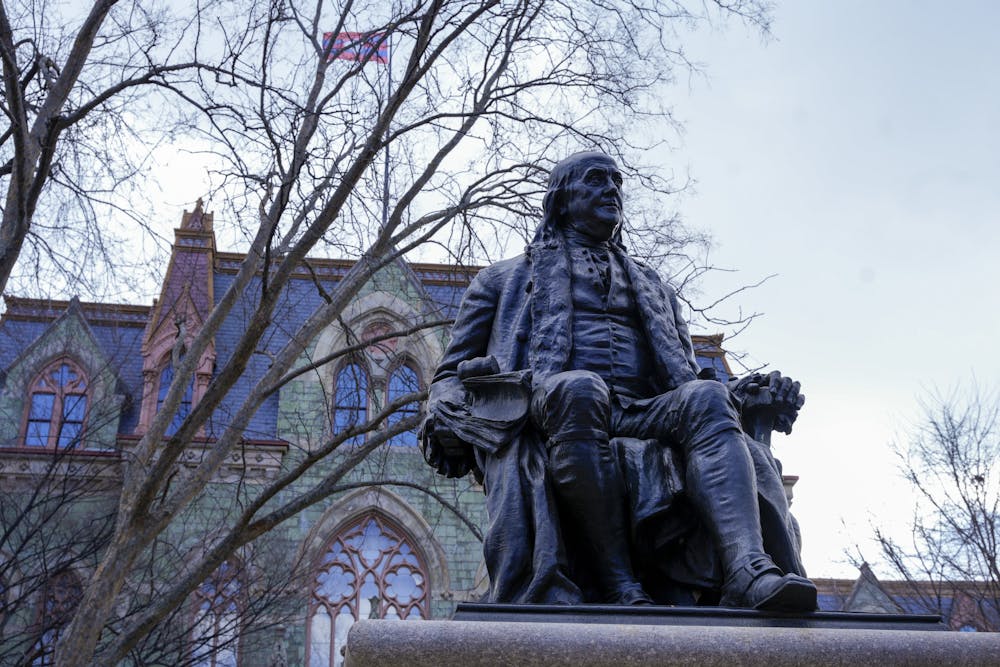
The Daily Pennsylvanian Editorial Board provides a pathway for Penn to progress in the environmental of ongoing challenges faced by higher education.
Credit: Jean ParkPenn was founded with a purpose distinct from its peers. While other colonial colleges trained clergy, Benjamin Franklin envisioned an institution rooted in public service, scientific advancement, and the practical improvement of society. Nearly three centuries later and 12 weeks into a new United States presidential administration, that foundation is beginning to crack. Sweeping federal actions have defunded research, dismantled diversity efforts, and targeted international students — policies that clash with the very ideals Franklin set forth. Now, as we stand before his creation, our home, it raises a difficult question: Do we rebuild it into something easier to accept, or fight to preserve what it was always meant to be?
The past 80 days of the second Trump term have been anything but normal. His administration has made eradicating diversity, equity, and inclusion a crucial policy point, with over 50 universities, including Penn, currently being investigated for their policies surrounding it. As a result, Penn has scrubbed websites and faculty titles. While Penn was trying to avoid federal scrutiny, its self-censorship has effectively shown us that equity-related commitments are expendable when politically inconvenient.
The crusade did not stop there: Donald Trump recently froze over $175 million of Penn’s federal research funding, attributing the decision to a transgender student-athlete competing on the women’s swimming and diving team in 2022. At the time of the student-athlete’s participation, NCAA rules required that transgender student-athletes be permitted to play at the collegiate level. However, in March, Trump retroactively applied a recent executive order — “Keeping Men Out of Women’s Sports” — to freeze this funding. As a result, Penn has released a plan of proactive financial measures that aim to ensure its core values live on: “protecting our missions, sustaining our culture, supporting our people, and judiciously managing our resources.”
Political attacks on universities have long reflected broader cultural and ideological battles. In the 1950s, McCarthyism saw professors blacklisted and fired over alleged ties to Communism, casting academia as a threat to national values. In the 1960s and ’70s, universities became focal points of antiwar and civil rights activism, prompting backlash — most notably from Ronald Reagan, who campaigned against the University of California system as a symbol of liberal excess.
Today’s critiques echo these earlier moments. From targeting diversity programs to questioning tenure, politicians continue to frame higher education as out of touch.
In March, Penn announced a University-wide hiring freeze in response to these anticipated funding cuts. To further reduce operational costs, both the Perelman School of Medicine and the School of Arts and Sciences implemented substantial cuts to their incoming graduate cohorts; in some cases, Penn rescinded offers already extended to prospective graduate students, citing financial uncertainty. Rescinding offers after acceptance not only destabilizes the careers of affected students, many of whom may have declined other opportunities, but also damages Penn’s reputation as an institution reliably committed to graduate education.
Penn should be consistent with its founding values and fight to preserve what it was meant to be. The school should foster the spirit of a liberal arts education by encouraging research and participation in academia through Ph.D. programs. It should use its other assets to increase its academic budget and close the gap left by federal fund cuts. Moreover, Penn must remain committed to inclusion and diversity by fostering spaces for academic discussion. The University should encourage free speech as long as it remains respectful to all groups on campus. When Penn bends, its values break.
In times of tumultuous national uncertainty, it is essential that we as students focus just as much energy on caring for ourselves and each other as we do on responding to the world around us. We can’t control national policy, but we can show up for each other. That can mean checking in with friends or sharing food and laughter. Penn can rally around the political attacks on higher education through community building. Share resources. Show up. Continue to care. Building solidarity is a form of resistance, too.
THE DAILY PENNSYLVANIAN EDITORIAL BOARD consists of senior staffers in the Opinion Department, led by the DP’s Editorial Board Chair Sangitha Aiyer. Currently, that team includes Ananya Shah, Diya Choksey, Piper Slinka-Petka, Mariana Martinez, Mritika Senthil, and Mia Vesely. Questions and comments should be directed to letters@thedp.com.
The Daily Pennsylvanian is an independent, student-run newspaper. Please consider making a donation to support the coverage that shapes the University. Your generosity ensures a future of strong journalism at Penn.
Donate







